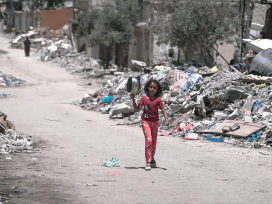
Since the collapse of Novi Sad’s train station in November, student-led protests have erupted across Serbia, inspiring a nationwide movement against corruption.
It’s over five years since COVID-19 broke out and changed the world. Yet many are still reluctant to discuss it’s impact. Nevertheless, the fallout stays with us, institutionally, economically and emotionally.
So many diseases have been transmitted to humans via other animals: the hall of fame includes the Influenza Epidemic of 1918 caused by birds and Ebola discovered in the mid-1970s that originated in fruit bats. Damn bats! I mean, they are cute. And they eat mosquitoes – which is among the best traits in any living organism. But why can’t they wash their hands properly?!?!
The list of legendary diseases continues: the plague and…drumroll, please…tuberculosis – despite advances in medical science, the latter is still going strong. Bats, rats and fleas are like wolves in sheep’s clothing.
In a sense, the COVID-19 pandemic of 2020 gave us a masterclass in epidemiology. The disparities between the wealthy and the most vulnerable of our society was made brutally clear. And who your political leader was at the time also made all the difference.
Forbes made an interesting observation during that time, when they asked: ‘What do countries with the best Coronavirus responses have in common?’ The answer: ‘women leaders’. In April 2020, the magazine praised seven female leaders who showed us what it takes to manage a crisis. Being truthful was essential: Angela Merkel talked sincerely and calmly about what measures needed to be taken and how serious the situation was. Decisiveness was another key factor, as Taiwan’s then prime minister Tsai Ing-wen made clear: she was one of the fastest acting politicians, introducing 124 measures without having to resort to lockdowns, who sent 10,000 face masks to the US and Europe. Iceland’s then prime minister Katrín Jakobsdóttir offered free coronavirus testing to all citizens, and Sanna Marin, the world’s youngest PM at the time, used social media influencers to help her Finish citizens stay informed about protection measures. Norway’s then prime minister, Erna Solberg, even made sure to talk directly to children, holding press conferences where no other adults were allowed, telling them ‘it is okay to be scared’.
The pandemic and subsequent lockdowns took a much higher toll on women, especially those in a caretaking role, instantly plummeting their employment opportunities and income. This proves that epidemics are not only a medical but also a social, political and cultural phenomenon, with long-lasting implications.
Of course, prevention is always much more effective than treatment, and vaccines play a crucial factor in this story. Vaccination has been key in eradicating polio and pushing down infectious diseases like smallpox.
Despite safe and proven inoculation having long been available, we face a cultural development: vaccine scepticism is leading to long-past pathogens, like measles, rearing their ugly heads. The US has a vaccine sceptic in charge of their health administration: Robert F. Kennedy junior doesn’t believe in pathogens and has been peddling disinformation and health hoaxes for years now. His appointment is surely great news for those dying from preventable illnesses for the sake of stupidity.
The stakes are high: bird flu and foot-and-mouth disease are doing the rounds across our continents; mpox seems to have been successfully contained, but other sexually transmitted diseases are rising year-on-year. And it doesn’t seem that societies are keen on implementing the lessons we should have learnt from COVID-19.
What have we forgotten and how could we prepare for further epidemics?
GUESTS
Carola Marquina is a licensed psychologist from the University of Lima, specializing in the clinical field. She provides support to individuals in need. She is passionate about understanding the human mind and is deeply committed to serving society.
Miriam Lindner is a nurse based in Vienna, Austria. She has two years of experience working in hospitals and emergency rooms. She completed her nursing education during the COVID-19 pandemic, gaining valuable training under challenging circumstances.
Nevena Mitranić, PhD, is an assistant professor at the Faculty of Philosophy, University of Belgrade. She works on national education projects and researches pre-school pedagogy. Her main focus is the importance of play in early childhood education.
Today we’re hosted by Foto Storm Media Podcast Studio in Novi Sad, courtesy of the Opens Youth Center Novi Sad.
Réka Kinga Papp anchor
Daniela Univazo writer-editor
Merve Akyel art director, Eurozine
Szilvia Pintér producer
Julia Sobota captions and translations
Zsófia Gabriella Papp digital producer
Priyanka Hutschenreiter project manager
Judit Csikós head of finance
Réka Kinga Papp editor-in-chief
Csilla Nagyné Kardos office administration
Gergely Áron Pápai DoP
Daniel Pitz camera
István Nagy sound
Nóra Ruszkai video editor
István Nagy lead video editor
Milán Golovics dialogue editor
Dániel Nagy dialogue editor
Victor Maria Lima animation
Crypt-of-Insomnia theme music
Disclosure
This talk show is a Display Europe production: a ground-breaking media platform anchored in public values.

This programme is co-funded by the European Commission and the European Cultural Foundation.
Importantly, the views and opinions expressed here are those of the authors and speakers only and do not necessarily reflect those of the European Union or the European Education and Culture Executive Agency (EACEA). Neither the European Union nor the EACEA can be held responsible for them.

Published 19 September 2025
Original in English
First published by Eurozine
© Eurozine
PDF/PRINTSubscribe to know what’s worth thinking about.

Since the collapse of Novi Sad’s train station in November, student-led protests have erupted across Serbia, inspiring a nationwide movement against corruption.

The psychological toll of living in a warzone is causing children in Gaza to lose their ability to communicate. But the immediate focus on survival means that children are not receiving the therapy they urgently need.